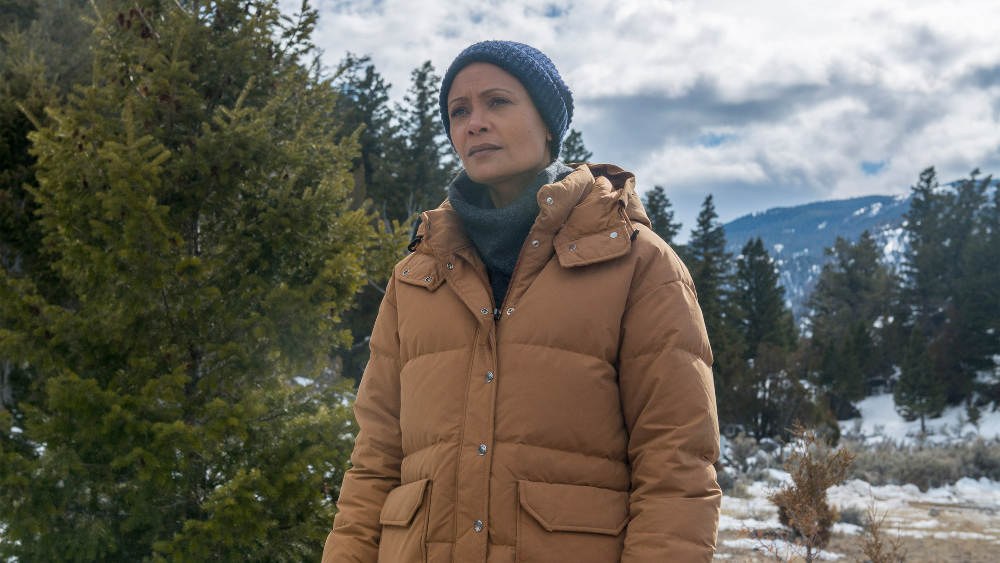
One of the most visually arresting films I saw at Sundance this year was Julian Higgins’ promising directorial debut God’s Country, which was shot by Higgins’ longtime DP Andrew Wheeler.
Wheeler has been working with Higgins since their days at AFI together, and their 2011 short film Thief won a Student Academy Award. He also shot Winter Light, the Higgins-directed short film on which God’s Country is based. Though the story has changed a bit from short to feature, the bare bones remain the same.
Thandiwe Newton (Westworld) stars as a grieving college professor who finds herself drawn into an escalating battle of wills with two hunters she catches trespassing on her property. Jefferson White and Joris Jarsky co-star as the hunters alongside standout character actors Jeremy Bobb and Kai Lennox.
Wheeler’s gorgeous cinematography captures the natural beauty of Montana — the God’s Country of the title — and effectively conveys how a series of microaggressions can have catastrophic consequences. The DP spoke to Below the Line as the Sundance Film Festival kicked off, so please enjoy our interview below:
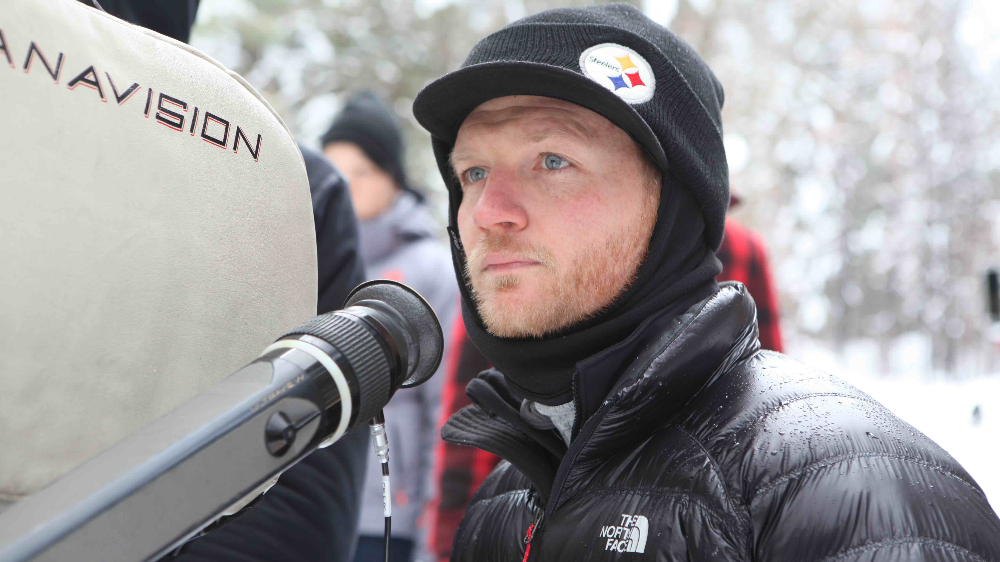
Below the Line: How’d you first meet Julian, because I know you’ve been working together for a long time even though this is his first feature?
Andrew Wheeler: Yes, time’s flying. Julian and I met our first year at the American Film Institute on one of the first-year, they call ’em cycle films. It was on the last one that we met, and I actually met him and our editor as well, Justin LaForge, who is also part of God’s Country, and we did our first-year film there together, and we just had such an easy time working together, we just kinda knew it was something special, so we decided to team up. Thief didn’t exist yet, but we were basically like, ‘let’s all just work together again next year on whatever our second-year thesis film becomes. So we made the choice without content that we were going to keep going for it together.
BTL: And you guys have been tied at the hip ever since?
Wheeler: Indeed, yeah. And So there are a few other short films in there as well, including one called Winter Light, which was the short film version of God’s Country, with a little bit of a different story, but a similar plot. And it starred Raymond Barry. That was a great experience. Different circumstances, different time, different era, but part of Julian’s and my process of working together, just kind of refining and maturing.
BTL: So when Julian got a chance to make this feature, it was a given that you’d be shooting it since you made the short film?
Wheeler: Well, yeah, if anything is a given in the business. But we talked a lot about a lot of things and our relationship has grown immensely over the years. But yeah, I was pretty involved, and I don’t think they were interviewing anybody else. I’ll put it that way.
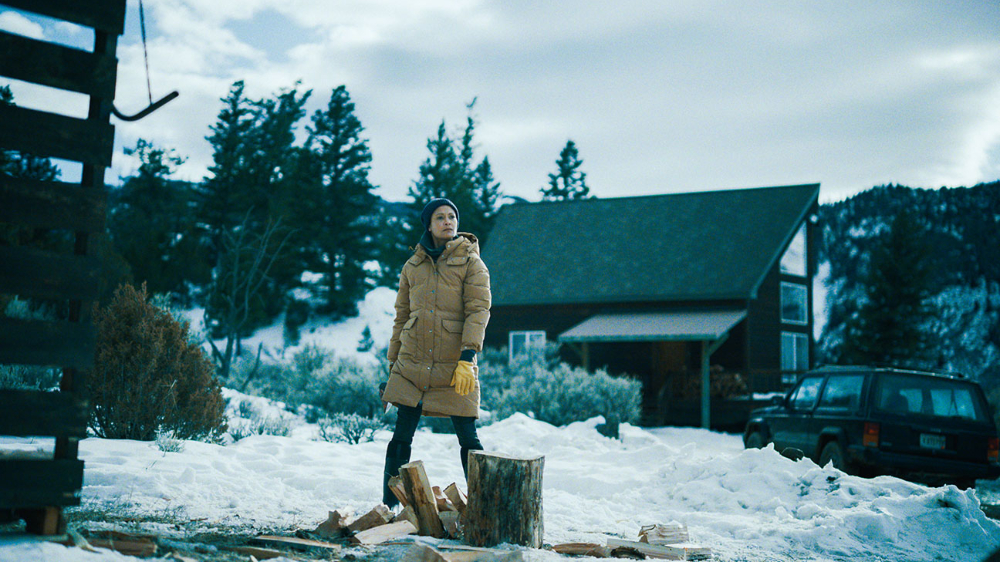
BTL: So where and when did you guys shoot God’s Country?
Wheeler: Well, that’s a good question. We shot it, uh, twice. So we actually shot the short in the Missoula area, and then we kind of worked our way toward the Bozeman/Livingston/Paradise Valley area, which is a bit east of there. I think we started scouting for it in 2019, just Julian and one of the producers and I, and I think he had gone up once before with maybe the production designer and someone else.
We went up for true prep starting in December, right after Christmas, at the end of 2019. He and I kind of went up on our own dime, to be honest, just to get the maximum amount of time, so we went up for a week or two before the rest of the crew came so we could start doing some things early. And then we started three or four weeks of actual prep, and we started shooting mid/late-February, and we made it all the way to the pandemic, which got us about halfway through the film, which was a big heartbreaker, honestly. We shot about 50-55% of the movie and eventually shut down in mid-March. I actually remember being one of the last movies going, I remember Panavision calling saying nobody’s shooting, we’re in Montana. I mean, there’s no COVID here yet. I think we lasted two days longer than everybody else.
And it was pretty heartbreaking, to be honest. Julian and I were very ready for this movie and it was going very well, and our initial feeling was, like, ‘of course this is what happens! We finally get to this place, doing this feature, and now there’s this big question mark.’
Everything was just in question in the world, and if I’m being honest about it, we knew we had shot good material, and maybe that made it even worse. There was an incredible, for lack of a better word, vibe, on the set. I feel like special movies, every now and then, the cast and crew talk about this pulse that’s running beneath the film, and everybody knows that something is happening, and this was definitely one of those movies. So it felt like losing an arm or something, like, a piece of ourselves because it felt like it was being taken away from us. So it was pretty rough the first few weeks, for me especially.
So at what point did you guys find out you were back on?
Wheeler: I don’t remember the exact date, but I think it was probably November 2020. A lot of it was working out schedules with actors and making sure that was going to be all right, and then it was like we did the process all over again. We kept calling it Season 2, which now feels like we should just be going into a Season 3 for no real reason. But we went back for Season 2 a lot stronger.
There were a lot of silver linings within that because half of the movie was put together, and we imposed a very strict style on this film, in terms of what the camera is doing, and maybe it was a little too much of a stranglehold, which we were aware of, but it enabled us to go back and not necessarily amend that, because it was definitely part of the style, but just to loosen it in certain moments, just to make sure it wasn’t so rigid. You also just inevitably start to see what works and what doesn’t, so we didn’t have to shoot all the stuff that was remaining, or we were able to change it a bit, and that was a real gift, to be honest.
What kind of cameras and lenses did you guys use?
Wheeler: I have a very strong relationship with Panavision and my rep over there, Mike Carter, he’s supported us basically since Thief and has continued to do so since, so he gave us more than a film of this budget could normally pay for and he made sure that we had everything that we needed, which was a Panavision DXL2, which is essentially like a Red Monstro, ultimately, but they’ve Panavized it, and we shot on their Panaspeed lenses. A set of Panaspeeds are a modern lens but with some interesting characteristics and some very strong fall-off. They’re pretty wide-open lenses.
The movie is a pretty wide-open, soft-focus movie, and I cringe when I describe it that way, for myself, because often what that means to me is you lose environment and you don’t understand where people are in the scale of things, but that’s also not what happened either, so we were very selective about the focus and those lenses that had very shallow focus allowed us to be very, very specific about how we would use focus, which was a big benefit, I think.
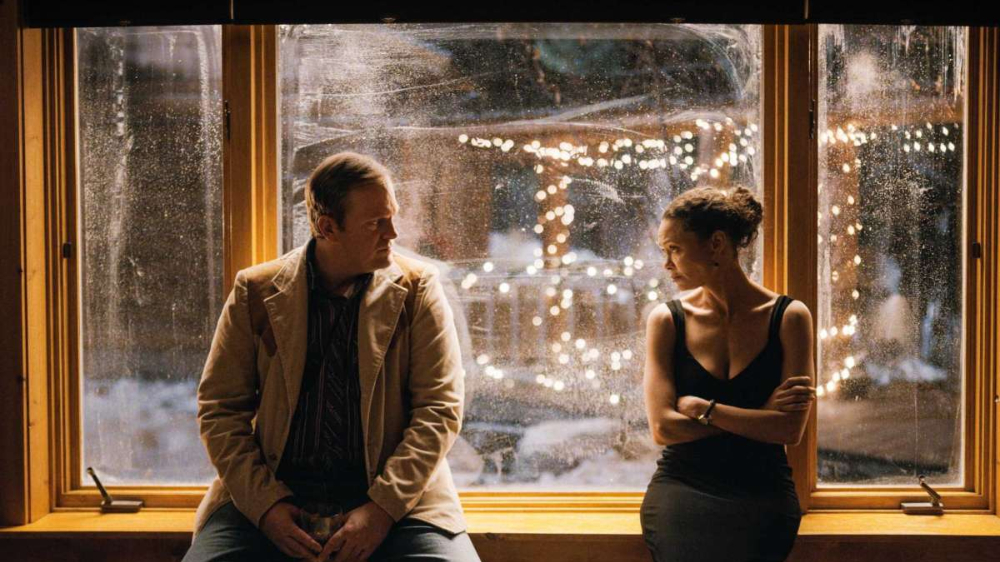
BTL: Were there any movies that you and Julian looked at together and took visual cues or inspiration from?
Wheeler: That’s an interesting question for me, and for us, because as we do these interviews and we’re sitting in the finished product of this movie and thinking about the process, the process isn’t very normal. Perhaps it’s not abnormal, but it’s not how people tell you to go about things, so the answer to that question is, we didn’t really look at stuff. We didn’t really listen to music, we didn’t look at art or look at photographs, we didn’t really do anything of those things, we just talked and talked and talked and scouted and scouted, and took photos and talked. I mean, there was conversation upon conversation about all these things, but we didn’t really take on influence in that regard. I mean, you inevitably do, but we weren’t specifically referring to anything at all.
BTL: So it was more just, like, intuitive?
Wheeler: Yeah, I mean, 13 years at this point of our relationship expanding and developing trust, and all of those things. Not normal for a first-time feature, maybe, but I’d say if we need a movie to talk about, I’d say Foxcatcher. We looked at movies, like, from the sense of the tone of the film, but not for specific inspiration about camera or lighting or lenses or blocking, it was always just about tone. I’d say Foxcatcher was a tonal and craft reference. That’d be a good one. I know it came up over the years, so that’s one of the movies I’d point to.
BTL: Did COVID affect how you set up your shots at all or make a particular scene more challenging to shoot?
Wheeler: For a lot of the people on the crew and some of actors, this was their first thing back doing, so I know there was a lot of nerves about that. I’d been shooting commercials for six months already, so in that regard, I kind of just knew how it was going to work. there were some questions before we got going in the second half, because — I don’t know how to talk about it — but I don’t think people’s representatives knew how they were supposed to protect their clients on set [given the unpredictability of the pandemic], if you know what I mean.
So there was definitely ‘you might have to do this, you might have to try this, you might not be allowed to have all these extras in the room, things like that, but none of it ended up being an issue. It was just standard protocol that we were dealing with, so no, I don’t think COVID got in the way.
I think it actually helped us in a way because we went back on our second half of the shoot, we had more days of shooting time than we would’ve had we just added the days to the schedule that we didn’t shoot the first time. So I think we ended up with like, three or four more extra days to account for COVID-lost time, but we didn’t really lose time, which made it a lot easier for us. We weren’t the kind of movie that shoots fast, and you’ve gotta go. We were very methodical about where the camera goes and how many shots we’d do in a day. We don’t work fast in the traditional sense.
BTL: Do you like being able to shift between features and commercials? Is it harder t bring your stamp to a project when you only have 30 seconds or a minute?
Wheeler: Yeah, I do, actually. I really like both worlds a lot. Nothing beats doing a feature that you really believe in and care about and goes well, but that being said, nothing’s worse than a feature where the opposite is happening, and in that regard, it doesn’t matter if a commercial is good or bad. To me, it supports better choices for movies, [because then] I’m not tied to how much I get paid on a movie. And obviously, I really like it and it’s great exercise for your skillset, and you meet people who do all kinds of different work, and you pick up different tips and tricks. I like both worlds a lot.
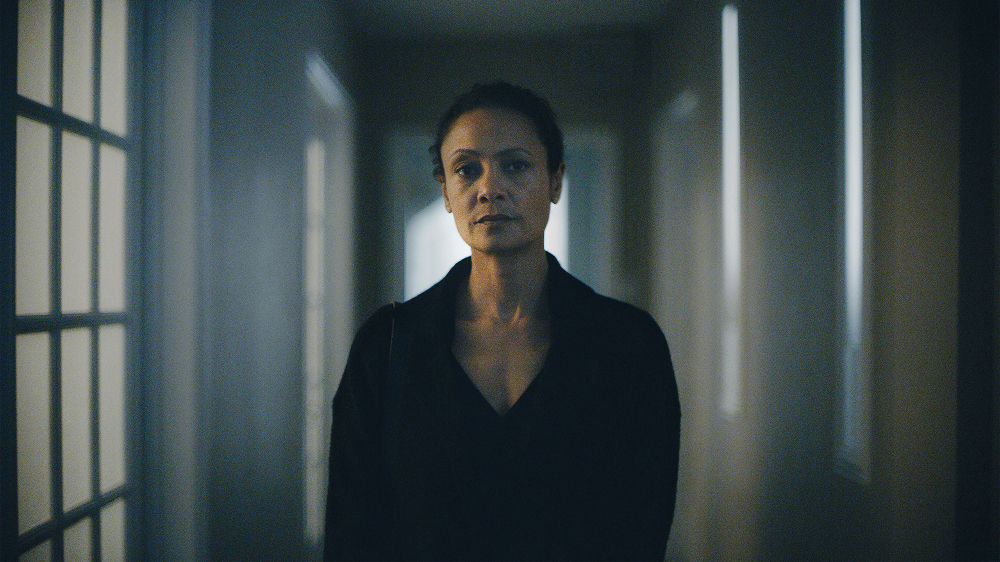
BTL: Why did you guys decide to change the title from Winter Light, which is the name of the original short story as well as the short film, to God’s Country?
Wheeler: You know what? I don’t know the answer to that question. I always thought the title was gonna change, to be honest. but Montana is considered God’s Country and we were always shooting in Montana, so it had to do with that, I presume. Plus, I think Ingmar Bergman has a movie called Winter Light, so we didn’t do that.
BTL: This was going to be your first time at Sundance, so what were you looking forward to most about the festival experience before it was forced to go all-digital?
Wheeler: Honestly, the screening itself is what I was looking most forward to, and knowing I’d see the cast and crew, and it was going to be a reunion of sorts. That’s a nice thing to have, and we’re still going to have it at some point somewhere, so that’s not lost on us, and maybe more people get to see the movie now. Honestly, it felt like a lot of the cool things that would’ve happened with meeting people and mingling around and meeting new directors, all that stuff was slowly being taken out of the festival before it was canceled anyway. It’s a bummer that that doesn’t exist but it’s okay. I think way more people are going to see the movie now.
BTL: You shot one of my favorite movies, Cheap Thrills, and I know you were on Variety’s 10 Cinematographers to Watch list early in your carer, so I’m curious if that opened any doors for you or if you felt any professional impact of making a list like that?
Wheeler: That movie’s a cult classic at this point, but it was a while ago. I think everything has an impact, positive or negative, and that was the first feature I had done that people knew about and saw, and it had a big SXSW premiere. That was early career for me, in a way, but it sort of allows you to move on to the next movie, in a sense, and I did another movie with Evan Katz after that called Small Crimes, so it helped in that regard. I mean, everything always feels slow as it’s happening and it’s quick in hindsight, so it’s hard to put into perspective what the immediate benefits were, but I think everything’s cumulatively a benefit in one way or another.
But Cheap Thrills was crazy, and I wasn’t the main DP on it. Another DP started it the movie, so for me, I don’t entirely see myself up on the screen when I watch that movie, but Evan is a very good friend and the original DP, Sebastian Winterø, is as well. I believe Sebastian had another project to jump to, and so he asked me to step in for the second half of filming.
BTL: So what is next for you, Andrew?
Wheeler: That’s the big question. There’s a TV show that I shot the pilot for that starts prep in March, so I may go shoot some TV, and there are some features on the table as well. If the right feature is there, that trumps everything for me, so I hope that this movie brings other high-quality projects my way. That’s the goal.
BTL: And hopefully continuing to work with Julian, I imagine?
Wheeler: You know what’s so crazy about [our relationship]? I started thinking about him in the way you think about family. It’s morose, but like, I hope one of us doesn’t get some crazy sickness or get in a car crash, because then we can’t continue this thing we started. He’s obviously a really close friend of mine [but] I never thought that way about people that I work with, where it’s like, ‘oh man, I just can’t wait for the next one!’ You don’t want that to be taken away from you in some way. This movie has been hacked at the legs with COVID, you know? Up-and-down, with starting and stopping, and then Sundance.
BTL It is, but you’re still standing.
Wheeler: We’re still here. We persevered.
God’s Country is an acquisition title at the 2022 Sundance Film Festival.





